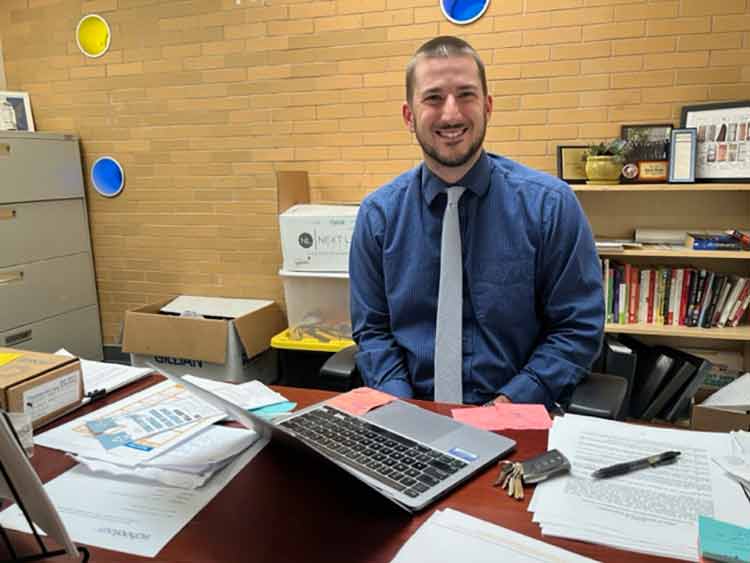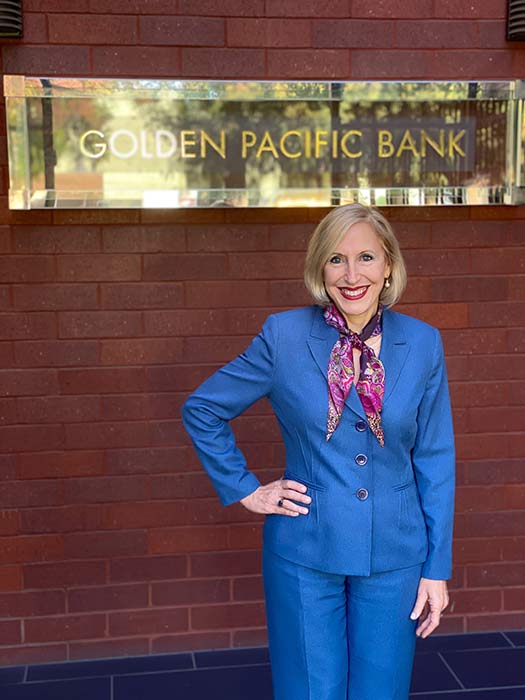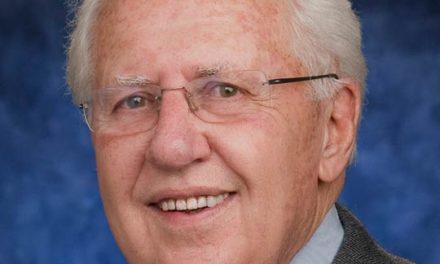A School Opens Its Doors to the Real World
Checking back in with one of our favorite dreamers
By Ed Goldman
When it comes to dreaming the impossible dream, Don Quixote had nothing on Kevin Dobson.
Some years ago, in his 20s, Dobson had already been a school principal, teacher and visionary. He pictured a charter school where high school kids from all cultures could learn construction industry skills—not just building things but designing them and even marketing them.
Kevin Dobson in his still-unpacked office. Photo by Edgy.
I wrote about his dream for this column a little more than two years ago. It posted shortly before he was to appear before the Sacramento County Board of Eduation, which had the option of approving or passing on Dobson’s precisely planned idea: a charter high school, which through his and his supporters’ efforts already had won approval to affiliate with a local college and state university campus to train young people for real jobs. The objective was to provide them with both classroom and onsite training to develop immediate employable skills.
I’m happy to report that last month, Capital College & Career Academy officially opened as a charter high school. The academy is at the former (and incongruous) site of an upscale furniture store, Limn, which had boldly sited itself in an economically embattled, culturally diverse part of Sacramento known as Del Paso Heights. It was a great store but apparently couldn’t overcome perceptions that its location wasn’t a safe place to buy designer sofas and armoires.
The other day I drove there and was afforded the rare privilege of stepping into someone else’s dream for a little while.
Dobson had worked with a cadre of volunteers, donors and fellow dreamers, many from the region’s top construction companies and local association which recognized the value of a feeder program to help grow and sustain its industry. They turned a beautiful but neglected facility into not only a campus but also, in some ways, a sanctuary for young people who might never have been offered that first leg up to solvency and citizenship.
The morning I’m there I’m greeted by Sherry Del Monte, a lively and helpful office manager who effortlessly rattles off all the statistics a visiting reporter could want: the current number of employees (13), students (54) and most important of all, how to access the building’s parking lot (I’ve not only left my car parked on a vulnerable side street but also, in a burst of street-smarts, left my wallet sitting on the passenger seat).
Del Monte is “the second employee at the academy,” she proudly informs me (Dobson is the first). Her boss has made her a nameplate for her sentry post at the front desk. It says, “She Who Must Be Obeyed.” I also meet John Pellman, a soft-spoken English teacher who’s been in public school education “about 20 years” and tells me that while that environment “was just fine” teaching here is “kind of why I wanted to be a teacher in the first place.”
Dobson and I watch 50-some ninth-grade kids from a variety of cultures—but largely the same under-served zip code—as they learn 3-D computer design, building skills, English, math, and even Mandarin, in a combo of indoor and outdoor classrooms. “Just be sure you don’t say this is a continuation school,” he says to me without a hint of his usual warmth. Apparently I telegraph my surprise at his cautionary tone and he quickly says, “No, of course you wouldn’t. You know what we are. You’ve written about us. Sorry.” One gets the impression Dobson has had to clarify his vision more than once for recurring skeptics.
Shortly after I arrive, students and teachers break for lunch, which Dobson is overseeing as just one more of his daily responsibilities. As he takes me on a tour, he also breaks away for a few moments to toss a football around with a couple of kids. In another setting I’d think his seemingly spontaneous regular-guy action was just for show; and even though he’s clever enough to have done that, the kids obviously dig it. And him.
He’s pretty hard to not like. Tall, athletic and exuberant, Dobson has a coach’s playground pipes but also the earnest demeanor of a lifelong learner. (The first time I interviewed him, in 2021, he took more notes during our chat than I did.) At just 33 years old, he’s an old-soul who works out every morning at 4:30 because, as he told me in that earlier interview, “I love to eat!”
“The school features a first of its kind partnership with the Sacramento-Sierra Building & Construction Trades Council and the Northern California Carpenters Apprenticeship—whose members built the school,” Dobson says. “It’s going to help solve a shortage of trade labor in Northern California—and more than that, give kids a chance to build meaningful careers.”
Tim Murphy, chief executive officer of the Sacramento Regional Builders Exchange and this year’s president of the Capital College & Career Academy, says the school is “providing construction-oriented high school students with education and training that can jump-start their professional or collegiate careers by several years.
For CCCA students going to college, they can enter with an Associate of Arts degree and “go right into construction management, engineering or architecture programs, saving them time and tuition expenses,” adds Murphy, whose association was an early adopter of CCCA’s reason-for-being.
Dobson and his wife Suzanne, who works in the call center for multiple Kaiser Hospital facilities—”But nobody will know who you mean if you don’t call her Susie,” he advises—have three children: Susie’s son Jordan from an earlier marriage, who’s 18 and starting computer studies at San Francisco State University; Jaxon, who’s 5 and likes to show up at school events; and their new baby Jazelyn.
“A lot of people thought this wasn’t possible,” says Dobson, tells me at the end of our visit. “But by the time these ninth graders become our first graduating class in four years, and we’ll have every other grade filled, maybe they’ll appreciate what we’re trying to accomplish.” Don Quixote couldn’t have put it better.
Ed Goldman's column appears almost every Monday, Wednesday and Friday. A former daily columnist for the Sacramento Business Journal, as well as monthly columnist for Sacramento Magazine and Comstock’s Business Magazine, he’s the author of five books, two plays and one musical (so far).
Yes, Virginia
A Weekly Blog by Virginia Varela
President, Golden Pacific Bank, a Division of SoFi Bank, N.A.
photo by Phoebe Verkouw
SOME “THIRD WORLD” ISSUES TAKE PLACE HERE
Menstrual hygiene supplies are a basic necessity that many low- income women lack.
According to UNICEF (the United Nations International Children’s Emergency Fund), 64 percent of women around the world—that’s a staggering two-thirds of women—were unable to afford needed menstrual hygiene supplies during the previous year. More than one fifth of women (21%) experienced this monthly.
While I might have thought that this was a Third World issue it’s a sad fact that many women in the United State share this uncomfortable and unsanitary issue—one that can impact their ability to work and live a comfortable life.
Recently, Golden Pacific Bank, a division of SoFi Bank, N.A., provided a $5,000 grant to Soroptimist International of Yuba Sutter, with funds specifically targeted to address the basic hygiene needs of women and girls.
Rhonda Logar, the group’s President, wrote to us:
“Soroptimist is a global volunteer organization that provides women and girls with access to the education and training they need to achieve economic empowerment. At Soroptimist, we help Women and Girls live their dreams.
“On behalf of our group…I would like to express our gratitude to Golden Pacific Bank for the generous grant of $5,000 that we have been awarded. With this grant, our group has collectively decided to create Blessing Bags that will consist of basic toiletry items. We will be gathering various items, assembling the bags and together we will choose a day to distribute them to less fortunate women and girls in our local community. We have decided to partner with the Yuba Sutter Food Bank for our distribution of the Blessing Bags.
“Thank you once again for choosing our group as the recipient of this valuable grant. We are eager to Bless others with this donation.”
May it be so.
sponsored content













